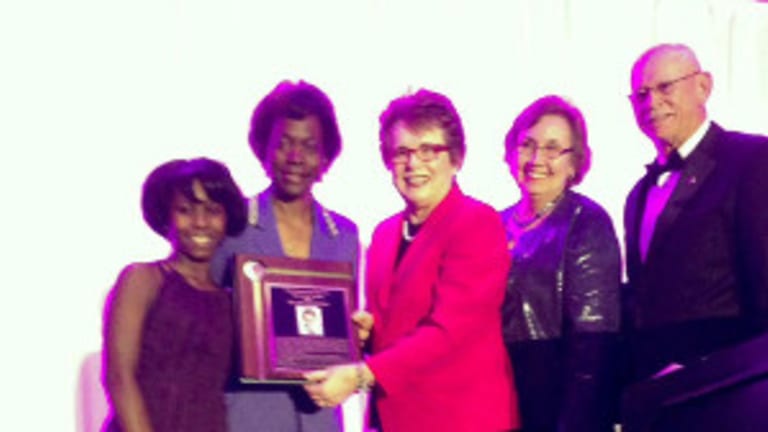BJK: I think it’s excellent. I think Stacey has done a great job. We need some new stars. As far as U.S. tennis, we need new stars coming up in the pipeline, but I don’t know if we have it. Grassroots level, I am concerned with our sport and I think we want the same thing for our sport, but a lot of us like to do it differently than others.
There are different ways of thinking about it, and I have been big on getting rid of the word “lesson.” When a child signs up for tennis, he or she is put on a team. I put them in a circle and then I make sure they name their own team. I would have them do their skill drills as a team and their fun drills together as a team, then they have to have a match at the end of every week. They can’t just have what they call a lesson today every week.
The kids today playing baseball or other sports, if a kid identifies with those sports by the age of 7, they stay. If we don’t get that same age group to identify with our sport then we aren’t going to get the best athletes. You want critical mass playing, but you also want your champion because a champion inspires. If we can get an American champion—men’s—and someone to follow in Serena’s footsteps, they’re both vital.
Critical mass at the grassroots level. The real sheroes and heroes are in the trenches with the kids. We’ve got to get the 10-and-under, 8-and-under, 6-and-under, and we have to get rid of the word “lesson.” A teaching professional, he or she should be a “coach.” Everybody understands the word coach in this country so we have to relate to the country, not game, the country. The culture in our country is that the coaches have respect, so let’s get rid of this “teaching professional,” that stinks, and just say coach. They have to practice, and the reason they have to have a match is because they have to have purpose for why they practice. If they are only playing an hour a week, they aren’t going to stay in the sport. You’re going to stay in a sport where you are playing 10 hours a week.
JS: Ten thousand hours of practice to get good at something, as Malcolm Gladwell said in the book Blink.
BJK: I was crazy about it. We had so few opportunities, but I also wanted to travel, and I knew tennis—I quickly understood you get to go to Wimbledon. My parents couldn’t afford to send me overseas so I thought, God, that would be great. We have a lot more competition today than we did back then. Now we are coming in last. Girls all want to play soccer, lacrosse, field hockey. I mean, I started the Women’s Sports Foundation in 1974, and we have about 130 or 140 sports. I always listen, I ask children, I even ask adults in tennis, “What are your children playing?” And most of the time it’s not tennis. It’s pathetic.
JS: Made me think of Graf and [Andre] Agassi I think their kids are into baseball and dancing, maybe soccer.
BJK: Team sports, thank you! I’ve been saying this for 55 years, and nobody agreed with us. And now, what is the average player’s age in grassroots?
JS: 37.
BJK: We need to get the babies. What do you think for a teaching pro or coach—when I say coach, that is what I mean. What do you think the average age of coaches?
JS: 43?
BJK: It’s 50 again. Do you think we are in a crisis?
JS: That would seem something of a graying crisis.
BJK: We need to get rid of memberships. I never would have had it. It’s a deterrent.
JS: There have been talks and murmurs.
BJK: You want people to feel like they belong to something. And not be elitist. You don’t want us to be elitist. People still say, “Oh, well, that’s an expensive sport.” I think everyone should be spending 80 percent of their money on the kids. What percentage of USTA members do you think go to the U.S. Open?
JS: 12 [percent]?
BJK: It’s a third. So if we have less and less people playing or thinking of us as a go-to, that’s a thing. Also, the destination tournaments, like the Indian Wells and Cincinnati tournaments, they’re only for rich people going on vacation. That’s not going to get kids playing. What are they identifying with?
JS: That’s where Venus and Serena probably made a great mark, coming from a sort of hardscrabble upbringing.
BJK: They have, but there are certain people who still won’t respond to them—they’re still racist.
JS: Speaking about Serena, where do you think she stands all-time now, having won two Grand Slams in 2013 and knocking on Martina [Navratilova] and Chrissie’s [Evert] door?
BJK: It’s funny now because, in my generation, Slams didn’t matter. It was tournaments, the tour. Now everybody’s into how many Slams you win. If they’re going to go on that criteria, eventually then, depending on how long she can play, she should be the greatest ever. She should be. She’s got to get to … 22 is Graf, right?
JS: Yes.
BJK: She took some years off, and she can pay attention.
JS: Thoughts on Madiba’s passing, Nelson Mandela. You tweeted about it:

